I am new to C++ and I am reading Stroustrup's book but I have a problem with the overload of an operator for a class. I have these 3 files:
I have two files as usual and in the header I have the definitions:
#ifndef EQUATIONS_H
#define EQUATIONS_H
#include<vector>
namespace equations {
//solve second degree equation
class eqSecDeg {
private:
double a;
double b;
double c;
std::vector<double> solArray;
double getDelta(double a, double b, double c);
public:
eqSecDeg(const double valA, const double valB, const double valC);
double getDelta();
std::vector<double> getSolutions();
//thrown with the error
class EquationError {
private:
char* msg;
int error_number;
public:
char* getMsg() { return msg; }
EquationError(char* a = "Error.", int err = 0) {
msg = a;
error_number = err;
};
};
//std::ostream& operator << (const std::ostream& x, eqSecDeg& A);
// ^ is commented but it gives the error that it should be declared with only 1 parameter (?)
};
}
#endif
Here you can see the implementation of the dqsecdegree.cpp:
#include<math.h>
#include "dqsecdegree.h"
namespace equations {
double eqSecDeg::getDelta(double a, double b, double c) {
return (b*b)-(4*a*c);
}
double eqSecDeg::getDelta() {
return (b*b)-(4*a*c);
}
//constructor
eqSecDeg::eqSecDeg(const double valA, const double valB, const double valC) {
if (valA == 0) {
throw EquationError("Parameter 'a' cannot be zero.", 1);
}
a = valA;
b = valB;
c = valC;
}
std::vector<double> eqSecDeg::getSolutions() {
double delta = getDelta(a,b,c);
if (delta >= 0) {
//x1 real and complex
solArray.push_back( (-b+sqrt(delta))/(2*a) );
solArray.push_back(0);
//x2 real and complex
solArray.push_back( (-b-sqrt(delta))/(2*a) );
solArray.push_back(0);
} else {
delta *= -1;
//x1 real and complex
solArray.push_back( -b/(2*a) );
solArray.push_back( (sqrt(delta)/(2*a)) );
//x2 real and complex
solArray.push_back( -b/(2*a) );
solArray.push_back( -(sqrt(delta)/(2*a)) );
}
return solArray;
}
std::ostream& eqSecDeg::operator << (std::ostream& x, eqSecDeg& A) {
return x << "something here";
}
}
There are a lot of answers on SO and google but I wasn't able to find the correct one. I am trying to understand how I have to use the operator overload. I guess that declaring the operator overload in the header file and its implementation on the cpp correct.
- Why is the compiler telling me that there are too many parameters? I am sure (?) that I need 2 of them (the ostream and the class)
- I know that the
friendkeyword only gives the access to all members without making the method be a part of the class. When I use that keyword the compiler tells me that there isn't a valid definition of ostream output for int/double/char/whatever. Where should I place the operator overload definition?
I can't understant where (and how) I have to implement it. Any suggestion?
Not very relevant but the main does something like this:
//a, b, c taken from the cin istream
equations::eqSecDeg solver(a,b,c);
std::vector<double> soluzioni = solver.getSolutions();
//here I'd like to call this
std::cout << solver;
